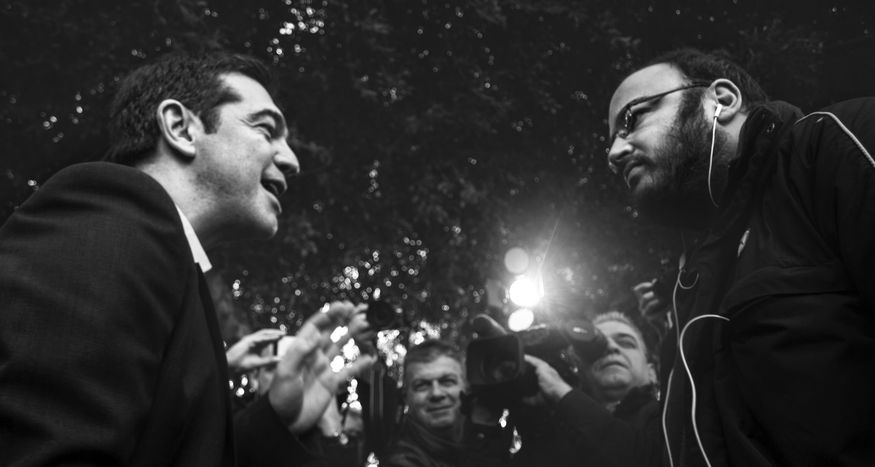
Greece: an election without a real alternative
Published on
Translation by:
Alison HaywoodIt's a bumper election year for Greeks within this new-European, post-democratic moment. Plenty of people are blaming Tsipras for misusing his resignation for party infighting. In many aspects, this is true. But the resigned prime minster doesn't really have a choice except for, well, the election.
There are some sadistic undertones in the fact that the Greek people have called an election for the third time this year. It's almost sadistic when you bear in mind what's actually up for a vote. A prime minister who mysteriously flipped from a transparent beacon of hope to a mysterious political realist in just seven months; a conservative party up to its ears in the Greek corruption dilemma; a neoliberal youth party without any platform to speak; the already-dead social democrats, or the fascists. Oh yeah - and the new Laiki Enotita (Popular Unity), which was founded by 25 former Syriza politicians as a left-wing protest party against Tsipras. Ouch. Democracy masochists are really spoilt for choice.
U-Turn, resignation, re-election?
Many Greeks still stand behind Tsipras. This is somewhat surprising, as his 180-degree political turn in July hardly could have been more dramatic. What kind of head of state would allow the people to vote in a referendum about a third bailout, only to go on to do exactly the opposite of what the clear majority of Greeks expressly wanted? And what kind of prime minister resigns and counts on the fact that the same people will re-elect him who he had just led astray not even two months earlier?
These are the questions the Greeks are asking right now. Right now, the fierce Syriza supporters, who had viewed Tsipras as a new beginning for Hellas, are a bit confused. Many feel like they've simply been betrayed. "I won't vote for him again, not one single time," said a 23-year-old hotel professional who had supported Tsipras during the campaign season. Many people on the left wing of the party feel the same way. For them, it was necessary to prevent a third referendum at all costs - even if it cost Greece the Euro.
For most Tsipras supporters, however, the new face of the Syriza party means just one thing: a closed book. "I try to understand him, but I just can't. I voted for him in January. Then I gave him my vote in July. Then he does the opposite of what the people have asked of him, and now he wants my vote again?" Many people feel the same way as this office worker in his late thirties. What is he going to do? Why did he do what he did?
Tsipras has a chance
Whether or not Tsipras gets re-elected depends on two things. First, there is no alternative. Syriza's landslide victory in January was due to its charismatic party leader. Several former PASOK-voters (the dying social democratic party under the leadership of the Greek Sigmar Gabriel, Evangelos Venizelos) support the left alliance. Not because they've become so terribly left-wing, but because PASOK doesn't really have anything to do with social democracy anymore. And then there's Nea Demokratia, the conservatives? A party deeply entangled in the web of corruption of the Greek republic? Well, the ultra-right former prime minister Samaras has now resigned. A significant number of loyal voters are happy about this. After all, the party had been letting Troika boss it around. Not for the good of the nation, of course, but primarily in order to keep up the old power structures.
Second, while Tsipras has lost votes on the left margin, he may now score the conservative middle. That's how it has been in parliament, where he was under the lashes of the Troika's whip - excuse me, of the institutions to quickly adopt reforms - which had vehemently rejected the left wing of the party. Only with the votes of Nea Dimokratia and the neoliberal Potami Party can he follow through.
No choice but a revote
It couldn't have lasted long with this 'disguised' minority leadership. Many have accused Tsipras of a coup, with which he hoped to get rid of the dissenting leftist voices in his own party. That can't be totally denied - and actually, it worked. Already the reshaping of the cabinet after the referendum was a first hint that the new pro-bailout course wasn't really in alignment with the party base.
Above all, this new course doesn't even have anything to do with the government mandate granted to him by the Greeks anymore. If you look at the provisions that Europe have given to Greece, you might dare to question why there were even negotiations at all. Ultimately, Tsipras and Varoufakis weren't able to accomplish one single point. Meanwhile, the former finance minister has been criticising other people in interviews and articles. If even a fraction of his claims were true about the German financial minister, the essentially anti-European course of the government would be even more obvious.
Tsipras needs the endorsement of the Greeks in order to continue governing. But on which basis? At first glance, he has broken all of his campaign promises - all of them. The question is, however, what Greece needs the most. And that is debt forgiveness. The European Central Bank wants it, the International Monetary Fund for a long time now as well, and the comission is split. The various national representatives of the EU are gathering behind the seemingly-omnipotent chancellor who officially still rejects the idea of debt forgiveness. But everyone knows that this can hardly be avoided. But that won't happen until after the German elections, because Merkel's own Greece course is now starting to lose support.
Tsipras is "quasi-gagged"
For Greece, the hope remains that Germany will finally relent. In the upcoming campaign blitz, the apparently gagged Tsipras will hardly be able to gain points, having broken all of his campaign promises in the hope of debt forgiveness. However, it's not just because it's already clear for most people, but because it is not enough to coax some concessions from the most important opponent. One cannot imagine how Bavarian politician Gerda Hasselfeldt, who herself is strongly pro-austerity, the Minister of Bavaria Söder, professional talk show host Bosbach or the finance minister would react, if Tsipras loudly called for debt relief.
With this, Tsipras is entering the campaign quasi-gagged and hopes to be re-elected - re-elected by the very people whose eyes he pulled wool over and dug in his spurs. Under the force of this impact, even the biggest lovers of democracy must painfully acknowledge the sadistic political reality of our time.
Intellectual sadomasochists could enjoy all of this if it weren't for the fascists. "Golden Dawn is the only party in parliament right now that's openly against the system. This attracts protest voters," explained Elenna Ioannidou, an MP for the Green Party in Germany. Especially at a time when a wave of refugees is sweeping across the land with the EU acts like it it is blind and deaf to them, can this party score points at the elections. Populist newspapers are reporting about ships that are bringing diseases into the country. The atmosphere is tense. Relying on the unconditional support of the voters could prove to be fatal.
First published August 25 on www.eudyssee.net
Translated from Griechenland: Keine Wahl als Wahl



